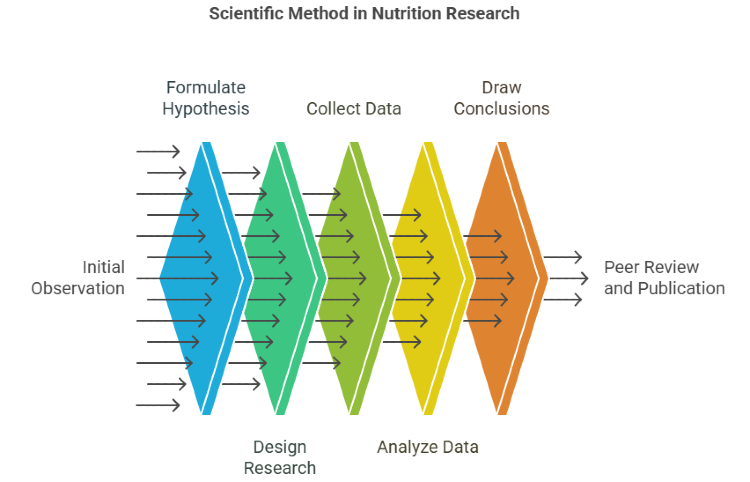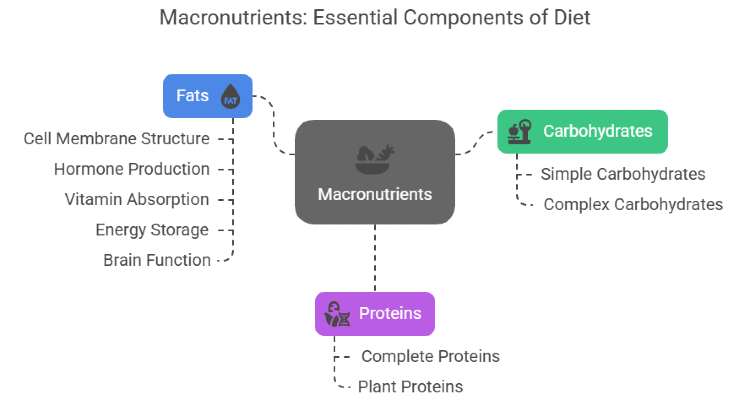Discover how the fascinating science of nutriology impacts your health, well-being, and quality of life through evidence-based nutritional principles.
Introduction
In a world overflowing with conflicting dietary advice and nutrition trends, understanding the core science behind what we eat has never been more important. Nutriology—the comprehensive study of nutrients and nutrition—provides the scientific foundation for making informed food choices that support optimal health and prevent disease.
Unlike popular diet books or social media trends, nutriology examines the intricate relationship between food compounds and human physiology through rigorous scientific research. This field encompasses how nutrients are digested, absorbed, and utilized by the body, as well as how they impact every aspect of our health, from cellular function to mental clarity.
In this comprehensive guide, we'll explore the fascinating world of nutriology, from its scientific foundations to practical applications that can transform your approach to food and nutrition. Whether you're a health professional seeking to deepen your knowledge or simply someone interested in making better dietary choices, understanding nutriology provides a powerful framework for navigating the complex world of nutrition.

1. What is Nutriology?
Etymology and Definition
The term "nutriology" combines "nutri" (from the Latin "nutrire," meaning to nourish) with "ology" (the study of a particular subject). While not as commonly used as "nutrition science" or "nutritional science," nutriology encompasses the systematic study of nutrients, their interactions within the body, and their impact on health.
Nutriology employs scientific methods to investigate questions such as:
- How are different nutrients processed in the human body?
- What quantities of specific nutrients do people need at different life stages?
- How do nutrients interact with each other and with medications?
- What role does nutrition play in preventing and managing diseases?
How Nutriology Relates to Nutrition Science and Dietetics
While the terms are often used interchangeably, there are subtle differences between nutriology, nutrition science, and dietetics:
- Nutriology is the broad scientific discipline studying nutrients and their effects on living organisms.
- Nutrition science often refers to the specific application of this knowledge to human health.
- Dietetics is the practical application of nutrition knowledge to help individuals make appropriate food choices based on health needs and preferences.
Think of nutriology as the foundational science, nutrition science as its human-focused application, and dietetics as the practical implementation of these principles in real-world settings.

2. The Role of Nutrients in the Body
The human body requires a diverse array of nutrients to maintain health and function properly. These nutrients are typically categorized as macronutrients (needed in larger amounts) and micronutrients (required in smaller quantities).
Macronutrients: The Building Blocks
Carbohydrates: These compounds serve as the body's primary energy source, providing 4 calories per gram. They include:
- Simple carbohydrates (sugars) found in fruits, some vegetables, and refined foods
- Complex carbohydrates (starches and fiber) are found in whole grains, legumes, and many vegetables
Proteins: Essential for tissue growth and repair, proteins provide 4 calories per gram and consist of amino acids—the body's building blocks. Complete proteins (containing all essential amino acids) come from animal products, while plant proteins can be combined to provide all necessary amino acids.
Fats: These nutrient-dense compounds provide 9 calories per gram and are essential for:
- Cell membrane structure
- Hormone production
- Absorption of fat-soluble vitamins
- Energy storage
- Brain function

Micronutrients: The Regulatory System
Vitamins: These organic compounds act as coenzymes in metabolic processes and are classified as either:
- Fat-soluble (A, D, E, K) – stored in fatty tissues and the liver
- Water-soluble (B complex, C) – not extensively stored and generally require regular consumption
Minerals: These inorganic elements support numerous bodily functions:
- Major minerals (calcium, phosphorus, magnesium, sodium, potassium, chloride, sulfur)
- Trace minerals (iron, zinc, copper, manganese, iodine, selenium, fluoride)
Functions of Nutrients
Nutrients serve three primary functions in the body:
- Energy production: Primarily through carbohydrates and fats, with proteins serving as a backup energy source
- Structural components: Building and maintaining tissues through proteins, some minerals, and certain fats
- Regulatory functions: Controlling bodily processes through vitamins, minerals, and specific proteins in the form of enzymes and hormones
3. The Science Behind Nutriology
Multidisciplinary Foundations
Nutriology draws from numerous scientific disciplines:
- Biology: Understanding cell function, metabolism, and physiological processes
- Chemistry: Analyzing the molecular structure and interactions of nutrients
- Biochemistry: Studying how nutrients are metabolized and utilized
- Genetics: Examining how genetic variations affect nutrient requirements and metabolism
- Physiology: Investigating how nutrients support body systems and functions
- Epidemiology: Researching connections between dietary patterns and disease rates

The Scientific Method in Nutrition Research
Nutritional science employs various research methodologies, each with strengths and limitations:
- Observational studies: Examining relationships between dietary habits and health outcomes in populations
- Intervention trials: Testing specific dietary changes under controlled conditions
- Metabolic studies: Investigating biochemical processes related to nutrient metabolism
- Animal studies: Using model organisms to understand fundamental nutrition principles
- Cellular research: Exploring nutrient effects at the cellular and molecular levels
The complexity of human nutrition makes this field particularly challenging. Researchers must account for countless variables, including genetic differences, lifestyle factors, environmental influences, and the intricate interactions between different foods and nutrients in the diet.
4. Key Principles of a Healthy Diet
The Five Factors of a Healthful Diet
Nutriology has identified five essential characteristics of a nutritionally sound diet:
- Adequacy: Providing sufficient energy and all essential nutrients
- Balance: Consuming appropriate proportions of different food groups
- Calorie control: Matching energy intake with expenditure to maintain a healthy weight
- Moderation: Limiting foods high in added sugars, sodium, and unhealthy fats
- Variety: Including diverse foods to ensure a broad spectrum of nutrients
Nutrient Density vs. Empty Calories
A cornerstone concept in nutriology is nutrient density—the amount of beneficial nutrients relative to the energy content of a food. Highly processed foods often provide "empty calories" (energy without substantial nutrients), while nutrient-dense foods deliver significant nutritional value per calorie.
For example, compare:
- A piece of fruit (nutrient-dense) vs. a candy bar (lower nutrient density)
- Whole grains (nutrient-dense) vs. refined grains (lower nutrient density)
- Lean protein sources (nutrient-dense) vs. processed meats (lower nutrient density)
Understanding this concept allows individuals to maximize the nutritional value of their caloric intake.

5. The Impact of Nutrition on Health
The Diet-Health Connection
Nutriology has established clear links between dietary patterns and health outcomes:
Chronic Disease Prevention: Research consistently shows that diets rich in whole foods, particularly fruits, vegetables, whole grains, and healthy fats, are associated with reduced risk of:
- Cardiovascular disease
- Type 2 diabetes
- Certain cancers
- Neurodegenerative disorders
Immune Function: Optimal intake of vitamins A, C, D, E, zinc, selenium, and protein supports immune system function and resilience against infections.
Mental Health: Emerging research suggests connections between diet quality and mental health, with potential implications for conditions like depression and anxiety.
Nutritional Pathways to Disease
Poor nutritional choices can contribute to disease through multiple mechanisms:
- Inflammation: Diets high in refined carbohydrates, unhealthy fats, and low in antioxidants promote chronic inflammation, an underlying factor in many diseases
- Oxidative stress: Insufficient intake of protective antioxidants can lead to cellular damage
- Microbiome disruption: Diet quality significantly impacts gut bacterial populations, which influence numerous aspects of health
- Metabolic dysregulation: Excess calorie consumption and poor nutrient balance can disrupt glucose regulation and energy metabolism
6. The Role of Nutritionists and Dietitians
Professional Distinctions
Professionals in the nutrition field include:
Registered Dietitian Nutritionists (RDNs): These professionals have completed accredited education programs, supervised practice, and passed a national examination. They must maintain continuing education and adhere to a code of ethics.
Nutritionists: This term has varying definitions depending on location. In some regions, "nutritionist" has no legal definition or educational requirements, while in other areas, it requires specific credentials.
Nutrition Scientists: Researchers who study nutrition at academic or research institutions, often holding advanced degrees in nutrition or related fields.
Application of Nutriology
These professionals apply nutriology principles through:
- Personalized nutrition assessment: Evaluating individual nutritional status and needs
- Medical nutrition therapy: Developing specialized diets for managing conditions like diabetes, kidney disease, or food allergies
- Community nutrition: Implementing programs to improve population health
- Sports nutrition: Optimizing performance and recovery for athletes
- Food science: Developing and evaluating food products and supplements

7. Nutrient Cycles and Food Sources
Environmental Nutrient Cycles
Nutrients move through complex environmental cycles before reaching our food:
- Carbon cycle: Fundamental to all organic compounds in food
- Nitrogen cycle: Essential for protein production in plants and animals
- Mineral cycles: Including calcium, phosphorus, and other essential elements
These cycles highlight how environmental health directly impacts food quality and nutrient availability.
Diverse Food Sources
Nutriology emphasizes the importance of varied food sources:
Plant foods provide:
- Carbohydrates (especially in grains, fruits, legumes)
- Fiber (in whole grains, vegetables, fruits, legumes)
- Plant proteins (in legumes, nuts, seeds, some grains)
- Phytonutrients (beneficial plant compounds with potential health effects)
- Many vitamins and minerals
Animal foods provide:
- High-quality complete proteins
- Vitamin B12 (not naturally found in plant foods)
- Highly bioavailable iron, zinc, and calcium
- Omega-3 fatty acids (especially in fatty fish)
A varied diet incorporating multiple food groups generally provides the most complete nutrition profile.

8. Common Nutrient Deficiencies and Excesses
Deficiency Conditions
Even in developed nations, nutrient deficiencies persist:
- Iron deficiency: The most common nutritional deficiency worldwide, causing fatigue and impaired cognitive function
- Vitamin D deficiency: Affecting bone health and possibly immune function
- Vitamin B12 deficiency: Particularly in older adults and those following strict plant-based diets
- Calcium inadequacy: Contributing to poor bone health and increased fracture risk
- Iodine deficiency: Still common in regions without iodized salt programs
Excess Concerns
Conversely, excessive intake of certain nutrients can pose health risks:
- Sodium excess: Linked to hypertension and cardiovascular disease
- Added sugar consumption: Associated with obesity, diabetes, and metabolic syndrome
- Certain vitamin/mineral toxicities: Particularly with fat-soluble vitamins and minerals like iron, when consumed in supplement form
The concept of hormesis—where some nutrients have beneficial effects at moderate levels but harmful effects at very high or very low levels—is an important principle in nutriology.
9. Modern Challenges in Nutriology
The Changing Food Environment
Today's food landscape presents unique nutritional challenges:
- Ultra-processed foods: Comprising over 50% of calories in many Western diets, these products often contain refined ingredients, additives, and minimal whole food components
- Changing eating patterns: Increased snacking, larger portion sizes, and more meals consumed away from home
- Food system complexity: Longer food chains with more processing steps between the farm and the table
- Environmental impacts: Food production methods affecting nutrient quality and sustainability
Nutrient Density in the Modern Diet
Modern food processing and agricultural practices can impact nutrient profiles:
- Soil depletion: Potentially affecting mineral content in crops
- Breeding for yield vs. nutrition: Some modern crop varieties are selected primarily for productivity rather than nutrient content
- Processing losses: Refinement processes remove nutrients from foods
- Fortification programs: Adding nutrients to commonly consumed foods to address population deficiencies
10. Tips for Applying Nutriology in Daily Life
Practical Nutrition Guidelines
Nutriology principles can be translated into everyday eating habits:
- Focus on whole foods: Build meals around minimally processed plant and animal foods
- Prioritize vegetables and fruits: Aim for half your plate to consist of these nutrient-dense foods
- Choose quality protein sources: Include a variety of animal and/or plant proteins
- Select whole grains: Opt for minimally processed grain products with intact fiber
- Include healthy fats: Incorporate sources of omega-3s and monounsaturated fats
- Stay hydrated: Water should be your primary beverage
- Practice mindful eating: Pay attention to hunger and fullness cues

Understanding Food Labels and Guidelines
Become an informed consumer by learning to:
- Read nutrition facts panels: Compare products based on nutrient content rather than marketing claims
- Understand ingredient lists: Look for short lists with recognizable ingredients
- Evaluate health claims: Distinguish between evidence-based statements and marketing hype
- Use dietary guidelines appropriately: Recognize that guidelines provide general recommendations that may need personalization
Conclusion
Nutriology provides the scientific foundation for understanding how the foods we eat affect our health, well-being, and quality of life. By applying evidence-based nutritional principles rather than following the latest fads, individuals can make informed choices that support long-term health.
The field continues to evolve as researchers uncover new insights about the complex relationships between nutrients, dietary patterns, and human physiology. From personalized nutrition based on genetic profiles to a deeper understanding of how food compounds influence cellular processes, nutriology remains a dynamic and essential science.
While nutrition information can sometimes seem contradictory or overwhelming, focusing on the core principles of nutriology—adequacy, balance, variety, moderation, and nutrient density—provides a stable framework for navigating dietary choices. When more specialized guidance is needed, qualified nutrition professionals can provide personalized recommendations based on the science of nutriology.
By understanding the basics of this foundational science, you're better equipped to make informed food choices, evaluate nutrition claims, and develop eating patterns that support your health goals and enhance your quality of life.
FAQs About Nutriology
What's the difference between a nutritionist and a dietitian? A registered dietitian (RD) or registered dietitian nutritionist (RDN) has completed specific education requirements, supervised practice, and passed a national examination. The term "nutritionist" is less regulated and may refer to someone with varying levels of nutrition education depending on the location.
How can I tell if nutrition information is scientifically sound? Look for information based on peer-reviewed research, provided by reputable health organizations, or from qualified health professionals. Be wary of claims promoting "miracle" foods or diets, those selling specific products, or advice not supported by mainstream scientific organizations.
Do I need to take vitamin supplements if I eat a balanced diet? Most people can meet their nutrient needs through food alone. However, certain groups may benefit from specific supplements, including pregnant women (folate, iron), older adults (vitamin B12, vitamin D), strict vegetarians/vegans (vitamin B12), or those with medical conditions affecting nutrient absorption.
How do I know if I have a nutrient deficiency? Common signs include unusual fatigue, slow healing, hair loss, and skin problems. However, many deficiencies develop gradually with subtle symptoms. If you suspect a deficiency, consult a healthcare provider who may recommend appropriate testing.
Can nutriology help with weight management? Yes. Understanding energy balance, nutrient density, hunger/fullness cues, and how different foods affect satiety can support healthy weight management. However, weight is influenced by many factors beyond nutrition, including genetics, sleep, stress, and physical activity.
Trusted Resources for Further Reading
- Academy of Nutrition and Dietetics: eatright.org
- Harvard T.H. Chan School of Public Health Nutrition Source: hsph.harvard.edu/nutritionsource
- National Institutes of Health Office of Dietary Supplements: ods.od.nih.gov
- World Health Organization Nutrition: who.int/health-topics/nutrition
- American Society for Nutrition: nutrition.org


